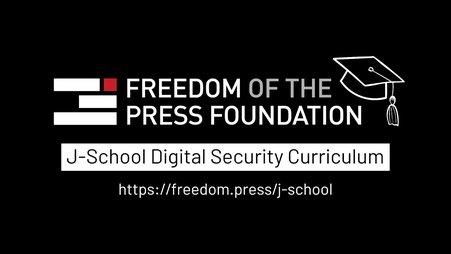
As documentary filmmakers tell brave stories, those stories are accompanied by big risks. Today, we're launching a digital security resource and free training clinic designed specifically to help film professionals navigate those risks, evaluate best practices, and step up their digital security.
Announcing the platform and clinic
In collaboration with renowned documentary production unit Field of Vision, our own digital security team at Freedom of the Press Foundation (FPF) is proud to release Digital Security for Filmmakers, an in-depth platform with dozens of digital security resources written specifically for the security needs of filmmakers.
Alongside this resource, our expert trainers are holding a digital security clinic from Sep 29 through Nov 3. The Digital Security Clinic, hosted with Field of Vision, features group training sessions and individual consultation slots open to all film professionals who fill out a short intake survey.
Navigating the platform
First-time visitors and seasoned digital security planners alike can use the interactive Risk Assessment module to work through the Digital Security for Filmmakers platform, identifying the topic guides and resources that pertain to their security priorities. This step-by-step risk assessment approach is an essential digital security skill, guiding filmmakers as they make connections between their most valuable information and the best defensive strategies to keep that information safe.

Each resource is tagged by topic and anticipated skill and risk level, so filmmakers can easily zero in on the skills they need.
The heart of the platform is a collection of more than 30 resources with detailed instructions on a variety of security strategies. From the All Resources page, you can filter between security topics, and even sort by skill or risk level.
If you have a general digital security concern, but aren't yet sure how to move forward with a solution, head to the Security Topics section. We cover five major security topics, with varied strategies on protecting footage, communicating within teams or with sources, locking down your mobile and desktop devices, and preparing your team for fieldwork.

The Best Practices page lists tips our team hand-picked for filmmakers who are looking for a concise digital security plan for right now.
It is important to us to make sure the resource is accessible to everyone, regardless of their level of familiarity with digital security. For those looking to gain a deeper understanding of digital security foundations, we offer an extensive glossary of terms used in the guide. Our best practices page highlights basic digital security practices every filmmaker should be familiar with, no matter their skill or risk level.
And, because digital security is just one component of a holistic security plan, readers can look to our resource hub for links to organizations that specialize in legal, physical security, or specific regional services.
Read on, sign up, and reach out
We are so excited to offer both the Digital Security for Filmmakers platform and Digital Security Clinic to the community.
We hope you enjoy exploring the Digital Security for Filmmakers platform. We plan to regularly incorporate community suggestions for new content and update existing resources as the landscape changes.
Learn more about the Clinic programming and how to sign up here.
As always, if you’re a filmmaker in need of some specialized assistance from our digital security training team, please get in touch to learn more.
Special thanks
This resource would not have happened without the thoughtful stewardship of award-winning filmmaker and FPF board member Laura Poitras, who conceived of this project and shaped it into what it is today. We are also so grateful to all the media makers who gave us their invaluable feedback, guidance, and time along the way, including Lyric Cabral, Yance Ford, Elena Fortes, Melissa Gira Grant, Ed Ou, and Malika Zouhali-Worrall. And, a special thanks to our project partner Field of Vision, and launch event host Sundance Institute.
Contributors: Vincent Abruzzo, Erinn Clark, Allegra Denton, Shakira Evans, Kristen Fitzpatrick, Harlo Holmes, David Huerta, Micah Lee, Fei Liu, Mackenzie Lukenbill, Olivia Martin, Kunal Mehta, Catherine Seo, and Martin Shelton.
Filmmaker interviewees: Lyric Cabral, Yance Ford, and Ed Ou. Interviews conducted by Henrik Moltke and Harlo Holmes.



